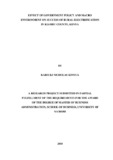| dc.description.abstract | This inquiry purposed to establish the effects of Government policy and Macro-environment on Kenya‟s rural electrification. Specifically, the research sought to assess the impact of government policy on Kenya‟s rural electrification and to investigate the influence of Macro-environment on Kenya‟s rural electrification in Kenya. This study used descriptive survey design. The study targeted households, the business community, schools under rural electrification and industries. This study used non-probability sampling approach of judgmental or purposive sampling. The selection of the sample selection was done based on the nature of the research objectives. The sample size was 500 from the total population of 4500 households (about 12% of the study population). This sample size corresponded to Mugenda & Mugenda, (2003) who states that, only small population (under 3000), a ratio of deserves a 10% sample size as a representative sample, depending on the topic under research. Questionnaires were used as the data collection instruments in this study for all categories of respondents. For all categories of respondents, feedback forms were used to gather data.. Qualitative data collected was analyzed using qualitative analysis of the written materials from respondent‟s personal expressions. It is flexible due to its breadth and its wide-ranging tools that is utilized as a problem‟s particular tactic or as a methodology. The data collected from the interviews was then summarized according to the theme of the study. Both inferential and descriptive statistics were used for quantitative data. The data was analyzed to determine its credibility, accuracy, consistency and usefulness. The investigator performed a multiple linear regression analysis to ascertain the connection amid Government Policy, Macro environment and rural electrification. The study found that electricity is significance in the economy of Kenya today. Electricity is important in running businesses in Kenya. Electricity connection helps in setting up businesses even in remote areas and increase activities in the rural areas. The demand of electricity is not influenced by the monthly payments. The factors that main determine electrification process are; the national government agenda on electrification, Kenya Power and Lighting Company commitment to distribution of electricity. Other factors include the nearness to other facilitates such as public primary and secondary schools and local elected leaders in the rural areas priorities on distribution of electricity. The study recommends that the government should formulate policies governing the budgeting and cost implications of the rural electrification projects. Clear policies on the monitoring and enforcement of contractors should be established to avoid inflated costs and perhaps improve project quality and safety. The government should make the process more flexible to enable more people to access the service. | en_US |



